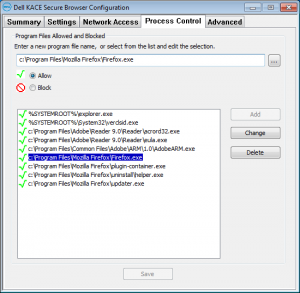 One way to stay safer online is to run your browser in a sandbox, where it’s isolated from your main PC: even if you’re infected by something unpleasant, this greatly limits the damage that malware can do.
One way to stay safer online is to run your browser in a sandbox, where it’s isolated from your main PC: even if you’re infected by something unpleasant, this greatly limits the damage that malware can do.
You don’t have a sandbox? Then one simple alternative is to download and install Dell KACE’s free Secure Browser, which essentially provides a virtualized version of Firefox 3.6.13.
Launch the program and it looks just like regular Firefox, but any process activities are virtualized, so if you’re infected by malware then it can’t (for instance) add Registry keys to launch itself automatically in future.
Secure Browser looks out for processes being launched via the browser, too, so if malware tries to launch a particular program it won’t happen until you explicitly give your permission.
Enable the Network Access Control option and you can additionally lock down the browser by specifically allowing or blocking particular sites.
You can still add browser favorites, or install your preferred Firefox extensions, just as normal. And you should be able to install and run Secure Browser alongside a regular Firefox installation without causing any problems. (This worked for us, but Firefox Profile management is a tricky business, so we’d recommend you back up your existing Firefox setup before installing Secure Browser, just to be safe.)
And if, despite all this, you still think you’ve been hit by a malware attack, then you can always hit the Reset button (click the leftmost button on the Secure Browser toolbar, click Reset). This will close all programs running in the virtualized session, delete all download files and so on, essentially restoring the Secure Browser to its default settings (although your favourites and home page can optionally be preserved).
There are some issues with the Secure Browser, too, most notably that it comes with an old version of Firefox: not ideal, security-wise. This seems to be easily fixed, though: we simply copied our existing Firefox installation to the appropriate Dell folder (C:\Program Files\Dell\Secure Browsers\Secure Browser (Firefox 3)\Firefox\Files\C\Program Files\Mozilla Firefox) and it was ready to go right away.
You don’t get the configurability here to match up with Sandboxie or Comodo’s sandboxing technology, then. Still, Secure Browser is straightforward, free and very easy to use, so if you’d like a browser sandbox without the usual hassles then it’s well worth a closer look.

